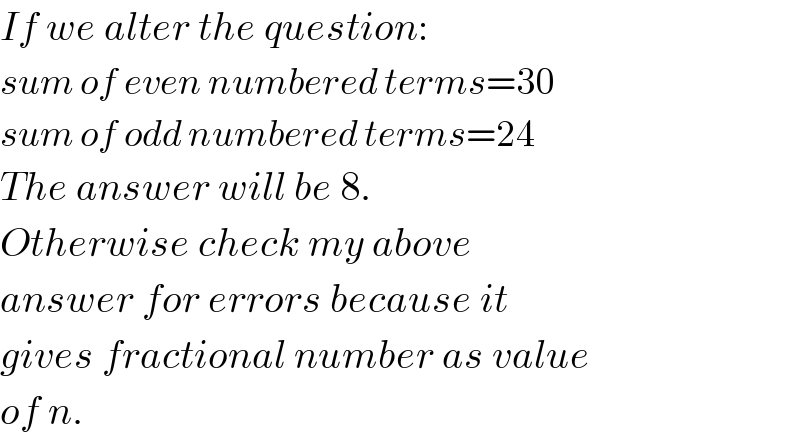Question Number 112810 by Aina Samuel Temidayo last updated on 09/Sep/20

Answered by Rasheed.Sindhi last updated on 10/Sep/20
![t_1 ,t_2 ,t_3 ,...,t_n ; n∈E............(1) Sum of odd numbered terms: t_1 +t_3 +t_5 +...+t_(n−1) =30....(2) Sum of even numbered terms: t_2 +t_4 +t_6 +...+t_n =24........(3) Last term exceeds first by 10.5: t_n −t_1 =10.5......................(4) n=? (1): a,a+d,a+2d,....,a+(n−1)d (4):t_n −t_1 = (a+(n−1)d)−(a)=10.5 d=((10.5)/(n−1))=((21)/(2(n−1))).....★ ⇒n=((10.5)/d)+1 (2):a+(a+2d)+(a+4d)+..(a+n−2^(−) d)=30 Number of terms(N)=n/2 First term(A)=a Common difference(D)=2d S=(N/2)[2A+(N−1).D] S=((n/2)/2)[2a+((n/2)−1)(2d)]=30 (n/4)[2a+(n−2)d]=30 ((na)/2)+((n(n−2)d)/4)=30 ((na)/2)=((120−n(n−2)d)/4).........A (3):(a+d)+(a+3d)+(a+5d)+..+a+(n−1)d=24 First term(A)=a+d Common difference(D)=2d Number of terms(N)=n/2 S=(N/2)[2A+(N−1).D] ((n/2)/2)[2(a+d)+((n/2)−1)(2d)]=24 (n/4)[2a+nd]=24 ((na)/2)+((n^2 d)/4)=24 ((na)/2)=24−((n^2 d)/4) ((na)/2)=((96−n^2 d)/4)..................B From A & B ((120−n(n−2)d)/4)=((96−n^2 d)/4) 120−n(n−2)d=96−n^2 d From ★: d=((21)/(2(n−1))) 120−n(n−2)(((21)/(2(n−1))))=96−n^2 (((21)/(2(n−1)))) ((240(n−1)−21n(n−2))/(2(n−1)))=((192(n−1)−21n^2 )/(2(n−1))) 240(n−1)−21n(n−2)=192(n−1)−21n^2 240n−240−21n(n−2)=192n−192−21n^2 48n−48−21n(n−2)=−21n^2 48n−48−21n^2 ^(×) +42n=−21n^2 ^(×) 48n−48+42n=0 Somewhere there is an error...](https://www.tinkutara.com/question/Q112869.png)
$${t}_{\mathrm{1}} ,{t}_{\mathrm{2}} ,{t}_{\mathrm{3}} ,…,{t}_{{n}} \:;\:{n}\in\mathbb{E}…………\left(\mathrm{1}\right) \\ $$$${Sum}\:{of}\:{odd}\:{numbered}\:{terms}: \\ $$$${t}_{\mathrm{1}} +{t}_{\mathrm{3}} +{t}_{\mathrm{5}} +…+{t}_{{n}−\mathrm{1}} =\mathrm{30}….\left(\mathrm{2}\right) \\ $$$${Sum}\:{of}\:{even}\:{numbered}\:{terms}: \\ $$$${t}_{\mathrm{2}} +{t}_{\mathrm{4}} +{t}_{\mathrm{6}} +…+{t}_{{n}} =\mathrm{24}……..\left(\mathrm{3}\right) \\ $$$${Last}\:{term}\:{exceeds}\:{first}\:\:{by}\:\mathrm{10}.\mathrm{5}: \\ $$$${t}_{{n}} −{t}_{\mathrm{1}} =\mathrm{10}.\mathrm{5}………………….\left(\mathrm{4}\right) \\ $$$${n}=? \\ $$$$\left(\mathrm{1}\right):\:\:{a},{a}+{d},{a}+\mathrm{2}{d},….,{a}+\left({n}−\mathrm{1}\right){d} \\ $$$$\left(\mathrm{4}\right):{t}_{{n}} −{t}_{\mathrm{1}} =\:\left({a}+\left({n}−\mathrm{1}\right){d}\right)−\left({a}\right)=\mathrm{10}.\mathrm{5} \\ $$$$\:\:\:\:\:\:\:\:\:\:\:\:\:\:\:\:\:\:{d}=\frac{\mathrm{10}.\mathrm{5}}{{n}−\mathrm{1}}=\frac{\mathrm{21}}{\mathrm{2}\left({n}−\mathrm{1}\right)}…..\bigstar \\ $$$$\:\:\:\:\:\:\Rightarrow{n}=\frac{\mathrm{10}.\mathrm{5}}{{d}}+\mathrm{1} \\ $$$$\left(\mathrm{2}\right):{a}+\left({a}+\mathrm{2}{d}\right)+\left({a}+\mathrm{4}{d}\right)+..\left({a}+\overline {{n}−\mathrm{2}}\:{d}\right)=\mathrm{30} \\ $$$$\:\:{Number}\:{of}\:{terms}\left(\mathrm{N}\right)={n}/\mathrm{2} \\ $$$$\:\:{First}\:{term}\left(\mathrm{A}\right)={a} \\ $$$$\:\:\:{Common}\:{difference}\left(\mathrm{D}\right)=\mathrm{2}{d} \\ $$$$\:\:\:{S}=\frac{\mathrm{N}}{\mathrm{2}}\left[\mathrm{2A}+\left(\mathrm{N}−\mathrm{1}\right).\mathrm{D}\right] \\ $$$$\:\:\:{S}=\frac{{n}/\mathrm{2}}{\mathrm{2}}\left[\mathrm{2}{a}+\left(\frac{{n}}{\mathrm{2}}−\mathrm{1}\right)\left(\mathrm{2}{d}\right)\right]=\mathrm{30} \\ $$$$\:\:\:\:\:\:\:\frac{{n}}{\mathrm{4}}\left[\mathrm{2}{a}+\left({n}−\mathrm{2}\right){d}\right]=\mathrm{30} \\ $$$$\:\:\:\:\:\frac{{na}}{\mathrm{2}}+\frac{{n}\left({n}−\mathrm{2}\right){d}}{\mathrm{4}}=\mathrm{30} \\ $$$$\:\:\:\:\:\frac{{na}}{\mathrm{2}}=\frac{\mathrm{120}−{n}\left({n}−\mathrm{2}\right){d}}{\mathrm{4}}………\mathrm{A} \\ $$$$\left(\mathrm{3}\right):\left({a}+{d}\right)+\left({a}+\mathrm{3}{d}\right)+\left({a}+\mathrm{5}{d}\right)+..+{a}+\left({n}−\mathrm{1}\right){d}=\mathrm{24} \\ $$$$\:\:\:\:\:\:\:{First}\:{term}\left(\mathrm{A}\right)={a}+{d} \\ $$$$\:\:\:\:\:\:\:{Common}\:{difference}\left(\mathrm{D}\right)=\mathrm{2}{d} \\ $$$$\:\:\:\:\:\:{Number}\:{of}\:{terms}\left(\mathrm{N}\right)={n}/\mathrm{2} \\ $$$$\:{S}=\frac{\mathrm{N}}{\mathrm{2}}\left[\mathrm{2A}+\left(\mathrm{N}−\mathrm{1}\right).\mathrm{D}\right] \\ $$$$\:\:\:\frac{{n}/\mathrm{2}}{\mathrm{2}}\left[\mathrm{2}\left({a}+{d}\right)+\left(\frac{{n}}{\mathrm{2}}−\mathrm{1}\right)\left(\mathrm{2}{d}\right)\right]=\mathrm{24} \\ $$$$\:\:\:\frac{{n}}{\mathrm{4}}\left[\mathrm{2}{a}+{nd}\right]=\mathrm{24} \\ $$$$\:\:\:\frac{{na}}{\mathrm{2}}+\frac{{n}^{\mathrm{2}} {d}}{\mathrm{4}}=\mathrm{24} \\ $$$$\:\:\:\frac{{na}}{\mathrm{2}}=\mathrm{24}−\frac{{n}^{\mathrm{2}} {d}}{\mathrm{4}} \\ $$$$\:\:\:\frac{{na}}{\mathrm{2}}=\frac{\mathrm{96}−{n}^{\mathrm{2}} {d}}{\mathrm{4}}………………\mathrm{B} \\ $$$${From}\:\mathrm{A}\:\&\:\mathrm{B} \\ $$$$\frac{\mathrm{120}−{n}\left({n}−\mathrm{2}\right){d}}{\mathrm{4}}=\frac{\mathrm{96}−{n}^{\mathrm{2}} {d}}{\mathrm{4}} \\ $$$$\mathrm{120}−{n}\left({n}−\mathrm{2}\right){d}=\mathrm{96}−{n}^{\mathrm{2}} {d} \\ $$$${From}\:\bigstar:\:{d}=\frac{\mathrm{21}}{\mathrm{2}\left({n}−\mathrm{1}\right)} \\ $$$$\mathrm{120}−{n}\left({n}−\mathrm{2}\right)\left(\frac{\mathrm{21}}{\mathrm{2}\left({n}−\mathrm{1}\right)}\right)=\mathrm{96}−{n}^{\mathrm{2}} \left(\frac{\mathrm{21}}{\mathrm{2}\left({n}−\mathrm{1}\right)}\right) \\ $$$$\frac{\mathrm{240}\left({n}−\mathrm{1}\right)−\mathrm{21}{n}\left({n}−\mathrm{2}\right)}{\mathrm{2}\left({n}−\mathrm{1}\right)}=\frac{\mathrm{192}\left({n}−\mathrm{1}\right)−\mathrm{21}{n}^{\mathrm{2}} }{\mathrm{2}\left({n}−\mathrm{1}\right)} \\ $$$$\mathrm{240}\left({n}−\mathrm{1}\right)−\mathrm{21}{n}\left({n}−\mathrm{2}\right)=\mathrm{192}\left({n}−\mathrm{1}\right)−\mathrm{21}{n}^{\mathrm{2}} \\ $$$$\mathrm{240}{n}−\mathrm{240}−\mathrm{21}{n}\left({n}−\mathrm{2}\right)=\mathrm{192}{n}−\mathrm{192}−\mathrm{21}{n}^{\mathrm{2}} \\ $$$$\mathrm{48}{n}−\mathrm{48}−\mathrm{21}{n}\left({n}−\mathrm{2}\right)=−\mathrm{21}{n}^{\mathrm{2}} \\ $$$$\mathrm{48}{n}−\mathrm{48}\overset{×} {−\mathrm{21}{n}^{\mathrm{2}} }+\mathrm{42}{n}=\overset{×} {−\mathrm{21}{n}^{\mathrm{2}} } \\ $$$$\mathrm{48}{n}−\mathrm{48}+\mathrm{42}{n}=\mathrm{0} \\ $$$${Somewhere}\:{there}\:{is}\:{an}\:{error}… \\ $$$$ \\ $$
Commented by Rasheed.Sindhi last updated on 10/Sep/20

$${Is}\:{the}\:{answer}\:\mathrm{8}? \\ $$
Commented by Rasheed.Sindhi last updated on 11/Sep/20

$${If}\:{we}\:{alter}\:{the}\:{question}: \\ $$$${sum}\:{of}\:{even}\:{numbered}\:{terms}=\mathrm{30} \\ $$$${sum}\:{of}\:{odd}\:{numbered}\:{terms}=\mathrm{24} \\ $$$${The}\:{answer}\:{will}\:{be}\:\mathrm{8}. \\ $$$${Otherwise}\:{check}\:{my}\:{above} \\ $$$${answer}\:{for}\:{errors}\:{because}\:{it} \\ $$$${gives}\:{fractional}\:{number}\:{as}\:{value} \\ $$$${of}\:{n}. \\ $$
Commented by Aina Samuel Temidayo last updated on 10/Sep/20

$$\mathrm{I}\:\mathrm{don}'\mathrm{t}\:\mathrm{know}\:\mathrm{the}\:\mathrm{answer}\:\mathrm{but}\:\mathrm{8}\:\mathrm{is}\:\mathrm{part}\:\mathrm{of}\:\mathrm{the}\:\mathrm{options}\:\mathrm{I}\:\mathrm{have}\:\mathrm{here}. \\ $$$$ \\ $$
Answered by 1549442205PVT last updated on 11/Sep/20
![Suppose the A.P has 2n terms and d is the its difference:{a_1 ,a_1 +d,...,a_1 +(2n−1)d} Since sum of odd numbered terms< Sum of even numbered terms,we infer a_1 is odd From the hypothesis a_(2n) −a_1 =10.5 we get (2n−1)d=10.5(1) Sum of n odd numbered terms equal to [a_1 +(2n−2)d]n/2=24(2) Sum of n even numbered terms equal to [a_2 +(2n−1)d].n/2=30(3) (2)(3)⇒((48)/(a_1 +(2n−2)d))=((60)/(a_2 +(2n−1)d)) ⇔48[a_2 +(2n−1)d]=60[a_1 +(2n−2)d] 4[a_1 +d+(2n−1)d]=5[a_1 +(2n−2)d] 4(a_1 +2nd)=5a_1 +10(n−1)d ⇔a_1 +(2n−10)d=0(4).From (1) we get d=((10.5)/(2n−1)).Replace into (4) we have a_1 +(2n−10)((10.5)/(2n−1))=0. ⇔(2n−1)a_1 +21n−105=0 ⇔a_1 =((105−21n)/(2n−1))⇔2a_1 =((210−42n)/(2n−1)) =−21+((189)/(2n−1))⇔(2n−1)(2a_1 +21)=189 ⇒(2a_1 +21)∣189=3^3 .7 ⇒(2a_1 +21)∈{1,3,7,9,21,27} determinant (((2a_1 +21),1,3,7,9,(21),(27)),((2n−1),(189),(63),(27),( 21),9,7),(a_1 ,(−10),(−9),(−7),( −6),0,3),(n,(95),(32),(14),(11),5,4)) The problem has six solutions : (a_1 ,2n)∈{(−10,190),(−9,64),(−7,28) ,(−6,22),(0,10),(3,8)}](https://www.tinkutara.com/question/Q112911.png)
$$\mathrm{Suppose}\:\mathrm{the}\:\mathrm{A}.\mathrm{P}\:\mathrm{has}\:\mathrm{2n}\:\mathrm{terms}\:\mathrm{and}\:\mathrm{d} \\ $$$$\mathrm{is}\:\mathrm{the}\:\mathrm{its}\:\mathrm{difference}:\left\{\mathrm{a}_{\mathrm{1}} ,\mathrm{a}_{\mathrm{1}} +\mathrm{d},…,\mathrm{a}_{\mathrm{1}} +\left(\mathrm{2n}−\mathrm{1}\right)\mathrm{d}\right\} \\ $$$$\mathrm{Since}\:\mathrm{sum}\:\mathrm{of}\:\mathrm{odd}\:\mathrm{numbered}\:\mathrm{terms}< \\ $$$$\mathrm{Sum}\:\mathrm{of}\:\mathrm{even}\:\:\mathrm{numbered}\:\mathrm{terms},\mathrm{we}\:\mathrm{infer} \\ $$$$\mathrm{a}_{\mathrm{1}} \mathrm{is}\:\mathrm{odd} \\ $$$$\mathrm{From}\:\mathrm{the}\:\mathrm{hypothesis}\:\mathrm{a}_{\mathrm{2n}} −\mathrm{a}_{\mathrm{1}} =\mathrm{10}.\mathrm{5} \\ $$$$\mathrm{we}\:\mathrm{get}\:\left(\mathrm{2n}−\mathrm{1}\right)\mathrm{d}=\mathrm{10}.\mathrm{5}\left(\mathrm{1}\right) \\ $$$$\mathrm{Sum}\:\mathrm{of}\:\mathrm{n}\:\mathrm{odd}\:\mathrm{numbered}\:\mathrm{terms}\:\mathrm{equal}\:\mathrm{to} \\ $$$$\left[\mathrm{a}_{\mathrm{1}} +\left(\mathrm{2n}−\mathrm{2}\right)\mathrm{d}\right]\mathrm{n}/\mathrm{2}=\mathrm{24}\left(\mathrm{2}\right) \\ $$$$\mathrm{Sum}\:\mathrm{of}\:\mathrm{n}\:\mathrm{even}\:\:\mathrm{numbered}\:\mathrm{terms}\:\:\mathrm{equal}\:\mathrm{to} \\ $$$$\left[\mathrm{a}_{\mathrm{2}} +\left(\mathrm{2n}−\mathrm{1}\right)\mathrm{d}\right].\mathrm{n}/\mathrm{2}=\mathrm{30}\left(\mathrm{3}\right) \\ $$$$\left(\mathrm{2}\right)\left(\mathrm{3}\right)\Rightarrow\frac{\mathrm{48}}{\mathrm{a}_{\mathrm{1}} +\left(\mathrm{2n}−\mathrm{2}\right)\mathrm{d}}=\frac{\mathrm{60}}{\mathrm{a}_{\mathrm{2}} +\left(\mathrm{2n}−\mathrm{1}\right)\mathrm{d}} \\ $$$$\Leftrightarrow\mathrm{48}\left[\mathrm{a}_{\mathrm{2}} +\left(\mathrm{2n}−\mathrm{1}\right)\mathrm{d}\right]=\mathrm{60}\left[\mathrm{a}_{\mathrm{1}} +\left(\mathrm{2n}−\mathrm{2}\right)\mathrm{d}\right] \\ $$$$\mathrm{4}\left[\mathrm{a}_{\mathrm{1}} +\mathrm{d}+\left(\mathrm{2n}−\mathrm{1}\right)\mathrm{d}\right]=\mathrm{5}\left[\mathrm{a}_{\mathrm{1}} +\left(\mathrm{2n}−\mathrm{2}\right)\mathrm{d}\right] \\ $$$$\mathrm{4}\left(\mathrm{a}_{\mathrm{1}} +\mathrm{2nd}\right)=\mathrm{5a}_{\mathrm{1}} +\mathrm{10}\left(\mathrm{n}−\mathrm{1}\right)\mathrm{d} \\ $$$$\Leftrightarrow\mathrm{a}_{\mathrm{1}} +\left(\mathrm{2n}−\mathrm{10}\right)\mathrm{d}=\mathrm{0}\left(\mathrm{4}\right).\mathrm{From}\:\left(\mathrm{1}\right)\:\mathrm{we} \\ $$$$\mathrm{get}\:\mathrm{d}=\frac{\mathrm{10}.\mathrm{5}}{\mathrm{2n}−\mathrm{1}}.\mathrm{Replace}\:\mathrm{into}\:\left(\mathrm{4}\right)\:\mathrm{we}\:\mathrm{have} \\ $$$$\mathrm{a}_{\mathrm{1}} +\left(\mathrm{2n}−\mathrm{10}\right)\frac{\mathrm{10}.\mathrm{5}}{\mathrm{2n}−\mathrm{1}}=\mathrm{0}. \\ $$$$\Leftrightarrow\left(\mathrm{2n}−\mathrm{1}\right)\mathrm{a}_{\mathrm{1}} +\mathrm{21n}−\mathrm{105}=\mathrm{0} \\ $$$$\Leftrightarrow\mathrm{a}_{\mathrm{1}} =\frac{\mathrm{105}−\mathrm{21n}}{\mathrm{2n}−\mathrm{1}}\Leftrightarrow\mathrm{2a}_{\mathrm{1}} =\frac{\mathrm{210}−\mathrm{42n}}{\mathrm{2n}−\mathrm{1}} \\ $$$$=−\mathrm{21}+\frac{\mathrm{189}}{\mathrm{2n}−\mathrm{1}}\Leftrightarrow\left(\mathrm{2n}−\mathrm{1}\right)\left(\mathrm{2a}_{\mathrm{1}} +\mathrm{21}\right)=\mathrm{189} \\ $$$$\Rightarrow\left(\mathrm{2a}_{\mathrm{1}} +\mathrm{21}\right)\mid\mathrm{189}=\mathrm{3}^{\mathrm{3}} .\mathrm{7} \\ $$$$\Rightarrow\left(\mathrm{2a}_{\mathrm{1}} +\mathrm{21}\right)\in\left\{\mathrm{1},\mathrm{3},\mathrm{7},\mathrm{9},\mathrm{21},\mathrm{27}\right\} \\ $$$$\begin{vmatrix}{\mathrm{2a}_{\mathrm{1}} +\mathrm{21}}&{\mathrm{1}}&{\mathrm{3}}&{\mathrm{7}}&{\mathrm{9}}&{\mathrm{21}}&{\mathrm{27}}\\{\mathrm{2n}−\mathrm{1}}&{\mathrm{189}}&{\mathrm{63}}&{\mathrm{27}}&{\:\mathrm{21}}&{\mathrm{9}}&{\mathrm{7}}\\{\mathrm{a}_{\mathrm{1}} }&{−\mathrm{10}}&{−\mathrm{9}}&{−\mathrm{7}}&{\:−\mathrm{6}}&{\mathrm{0}}&{\mathrm{3}}\\{\mathrm{n}}&{\mathrm{95}}&{\mathrm{32}}&{\mathrm{14}}&{\mathrm{11}}&{\mathrm{5}}&{\mathrm{4}}\end{vmatrix} \\ $$$$\boldsymbol{\mathrm{The}}\:\boldsymbol{\mathrm{problem}}\:\boldsymbol{\mathrm{has}}\:\boldsymbol{\mathrm{six}}\:\boldsymbol{\mathrm{solution}}\mathrm{s}\:\:: \\ $$$$\left(\boldsymbol{\mathrm{a}}_{\mathrm{1}} ,\mathrm{2}\boldsymbol{\mathrm{n}}\right)\in\left\{\left(−\mathrm{10},\mathrm{190}\right),\left(−\mathrm{9},\mathrm{64}\right),\left(−\mathrm{7},\mathrm{28}\right)\right. \\ $$$$\left.,\left(−\mathrm{6},\mathrm{22}\right),\left(\mathrm{0},\mathrm{10}\right),\left(\mathrm{3},\mathrm{8}\right)\right\} \\ $$
Commented by Aina Samuel Temidayo last updated on 10/Sep/20

$$\mathrm{I}\:\mathrm{don}'\mathrm{t}\:\mathrm{understand}.\:\mathrm{We}\:\mathrm{are}\:\mathrm{to}\:\mathrm{find}\:\mathrm{the} \\ $$$$\mathrm{number}\:\mathrm{of}\:\mathrm{terms}.\:\mathrm{The}\:\mathrm{answer}\:\mathrm{to}\:\mathrm{this} \\ $$$$\mathrm{question}\:\mathrm{is}\:\mathrm{just}\:\mathrm{a}\:\mathrm{natural}\:\mathrm{number}. \\ $$
Commented by 1549442205PVT last updated on 11/Sep/20

$$\mathrm{Number}\:\mathrm{of}\:\mathrm{terms}\:\mathrm{is}\:\mathrm{2n}.\mathrm{Since}\:\mathrm{our}\: \\ $$$$\mathrm{problem}\:\mathrm{has}\:\mathrm{six}\:\mathrm{answers} \\ $$$$\mathrm{corresponding}\:\mathrm{to}\:\mathrm{six}\:\mathrm{first}\:\mathrm{terms}\:\left(\mathrm{a}_{\mathrm{1}} \right) \\ $$$$,\mathrm{so}\:\mathrm{answer}\:\mathrm{is}\:\mathrm{a}\:\mathrm{pair}\:\mathrm{of}\:\left(\mathrm{a}_{\mathrm{1}} ,\mathrm{2n}\right) \\ $$$$\mathrm{Here},\mathrm{number}\:\mathrm{of}\:\mathrm{terms}\:\mathrm{of}\:\mathrm{six}\:\mathrm{APs}\:\mathrm{we} \\ $$$$\mathrm{find}\:\mathrm{out}\:\mathrm{are}:\mathrm{2n}\in\left\{\mathrm{170},\mathrm{64},\mathrm{28},\mathrm{22},\mathrm{10},\mathrm{8}\right\} \\ $$$$\mathrm{corresponding}\:\mathrm{to}\:\mathrm{first}\:\mathrm{terms}\:\mathrm{are} \\ $$$$\mathrm{a}_{\mathrm{1}} \in\left\{−\mathrm{10},−\mathrm{9},−\mathrm{7},−\mathrm{6},\mathrm{0},\mathrm{3}\right\} \\ $$$$\mathrm{Sometimes}\:\mathrm{the}\:\mathrm{answer}\:\mathrm{of}\:\mathrm{option} \\ $$$$\mathrm{question}\:\mathrm{isn}'\mathrm{t}\:\mathrm{correct}.\mathrm{Perhaps},\mathrm{you}\:\mathrm{seen} \\ $$$$\mathrm{that}\:\mathrm{thing}\:\mathrm{on}\:\mathrm{the}\:\mathrm{forum}.\mathrm{We}\:\mathrm{must}\:\mathrm{keep} \\ $$$$\mathrm{the}\:\mathrm{bravery}\:\mathrm{of}\:\mathrm{mathematicians} \\ $$
